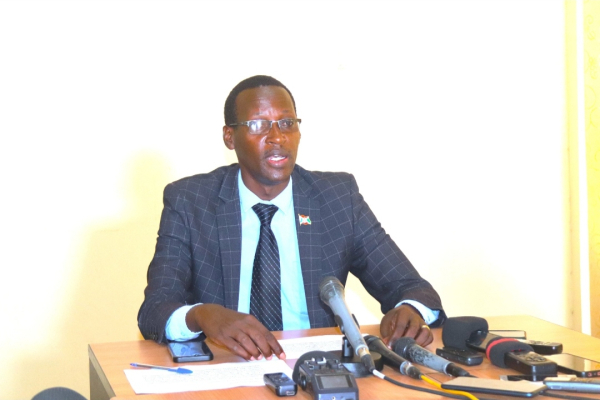The Burundian government has pledged to modernize services offered to citizens. However, several regions of the country still lack comprehensive internet coverage and digital skills, limiting access to digital services in these areas.
On Monday, April 29, the Ministry of Communication, Information Technology, and Media announced the launch of a national survey on ICT access and usage among households, businesses, and public administrations in Burundi. This initiative aims to assess the state of digital service usage and access while identifying the knowledge and needs of the Burundian population.
According to Thierry Kitamoya (photo), Assistant to the Minister for ICT, this survey is part of the Digital Economy Foundations Support Project (PAFEN), financed by the World Bank to the tune of $92 million. The PAFEN aims to expand broadband internet access for underserved populations, enhance the government's capacity to provide digital services, and lay the groundwork for accelerated digital economy development in Burundi.
The survey, which began on April 29, will continue until May 17, led by the Burundian Center for Population and Development Studies (CERPED) and the Tunisian company SFM Technologies. The survey will target varied samples across different communes and provinces to provide a comprehensive overview of ICT access and usage in Burundi.
The survey results will inform the design and goals of digital access programs, the formulation of new broadband policies, and the assessment of ICT penetration levels in Burundi.
This innovative solution is designed to help two groups of people: those seeking safe and affordable rides without a car, and drivers looking to share travel costs with reliable passengers.
Nabhorelan, a Guinean startup, has developed a carpooling solution that allows users to share rides with others traveling in the same direction or to the same destination. The startup, based in Conakry, was established in 2022 by founders Diallo Aissatou Bailo and Diallo Thierno Mamadou Oury.
“Our platform bridges the gap between passengers and drivers who have a shared objective: reaching the same destination. We ensure a safe and convenient travel experience in terms of cost and comfort by assisting you in finding the journey that aligns best with your needs,” the startup explains.
The Nabhorelan solution includes a mobile app, available on both iOS and Android platforms. After installing the app, users create an account to access a variety of services. Users wishing to also have a driver profile are required to provide their ID, driver’s license, or the vehicle’s registration certificate for account validation.
To book a ride, travelers input their journey details, such as departure and arrival cities, departure date, and the number of travelers, into the search bar. The platform then displays available trips. Drivers have the option to approve the ride if the conditions suit them. Also, drivers can post their route and set their prices. Passengers can then decide whether to accept the offer based on the driver’s terms. If both parties agree, a meeting is arranged.
Adoni Conrad Quenum
His primary goal is to help all types of businesses, whether small or large, thrive in Africa. To achieve this, he leverages his digital expertise to create innovative solutions tailored to every user’s needs.
Brice Gboyou (photo) is a Beninese developer, designer, AI specialist, and entrepreneur. As the founder and CEO of All Web Service, he provides digital services to businesses.
All Web Service, a digital production agency founded in 2015, aims to be a catalyst for business digital transformation. Over nine years of operation, it has successfully completed several projects, including Afriyo, Artiweb, Aginap, Kloo, WaChap, and Agodjié, benefiting over 200,000 clients.
Afriyo is an app that offers one-click access to a variety of services, products, companies, and people using artificial intelligence, simplifying e-commerce across Africa. Artiweb, on the other hand, serves as a community and social network for web professionals in Francophone Africa, providing tools, resources, training, and professional opportunities.
Aginap is an application that simplifies marketing, sales, and customer relationship management via a multichannel chatbot powered by AI, present on platforms like WhatsApp, Messenger, Facebook, Instagram, Telegram, Viber, SMS, Voice, and websites. Kloo is a platform that facilitates information sharing and online sales. It allows the creation of links and pages in various formats and generates dynamic QR codes to share information and access statistics.
WaChap is a web application that automates WhatsApp marketing, helping e-merchants optimize sales and manage conversations and customer relationships efficiently while saving time through chatbot features. “With WaChap, you can set up a chatbot or robot to automatically respond to incoming messages, improving customer service efficiency and maintaining consistent engagement with your customers. Nobody likes to wait,” Brice Gboyou said in 2023.
Agodjié is a virtual personal assistant. Using AI and accessible via WhatsApp, Messenger, Telegram, and Instagram, it answers questions across various fields.
All these solutions, offered as software services (SaaS) and developed by Brice Gboyou and his team, aim to help businesses increase their visibility and revenue through the opportunities provided by the digital world.
Melchior Koba
Access to high-speed internet connectivity is now indispensable in Africa, where digital transformation is accelerating. However, the high cost of internet remains a significant barrier for a population eager to take advantage of new technologies.
The Malagasy government has rescinded its recent decision to raise the price of a gigabyte of data to $0.95, reversing a policy introduced last month. This U-turn was announced by the Ministry of Digital Development, Posts, and Telecommunications (MNDPT) in a statement following a review of internet service providers' pricing practices in the country.
"The government found that the artificially high prices maintained by telecommunications operators did not reflect the commitments made during negotiations. As a result, this measure aims to restore fair competition and reduce costs for end users," said the MNDPT statement.
Initially, the government had decided to raise the price of a gigabyte from $0.45 to $0.95, justifying this measure by arguing that it would promote a more equitable distribution of internet access across the country. However, this decision made internet access increasingly difficult for many Malagasy citizens, further widening the existing digital divide.
In response to their customers' needs, several providers did not implement the new rates. According to data from Kepios, a consultancy specializing in digital usage studies, Madagascar had 3.8 million social media users as of January 2024. Following the price hike, many internet users were forced to cut back on their internet-related expenses or visit cybercafés, thus turning what was once a widely accessible service into a luxury product in Madagascar.
The suspension of this decision is expected to pave the way for new discussions between the government and the country's mobile operators. A potential reduction in prices should help liberalize the market and allow various users to reconnect with the internet, which is a crucial tool for students, traders, and local startup founders.
Samira Njoya
Ghanaian healthtech DrDoGood has launched a Diabetes Management Program to support 5,000 Ghanaians with diabetes
The program provides educational resources, community support, and access to healthcare professionals, covering topics like diabetes management, nutrition, exercise, and mental health. Regular support group meetings and recognition initiatives are part of the community support.
Members can access healthcare professionals for personalized guidance and regular health monitoring.
A computer scientist by training, he's passionate about building tech solutions that empower businesses. His expertise has fueled the design of hundreds of digital projects.
Wassel Berrayana (photo) is a Tunisian entrepreneur and the founder and CEO of Proxym Group, which provides digital services across various sectors in Europe, the Middle East, and Africa. Established in 2006, Proxym Group is a digital services company focusing on connectivity and information systems in the financial (banks, microfinance, and insurance) and governmental sectors. Its primary mission is to assist financial and governmental institutions in their digital transition.
Proxym Group is also recognized as a digital solutions integrator. Through its subsidiary, Bankerise, it offers ready-to-use applications designed to help banks increase their conversion rates, retain customers, and reduce financial expenditures. The goal of this digital banking engagement platform is to ease the transition of retail and corporate banks into the digital era.
To date, Proxym Group operates in over 20 countries, employing more than 250 digital consultants across five centers of excellence worldwide. The company claims to have completed more than 400 digital projects.
Wassel Berrayana graduated from Grenoble INP – Ensimag in 1996 with a master's degree in computer science. He also holds a master's degree in management and international business. He began his professional career in 1996 at TELNET as a computer engineer and joined Hewlett-Packard (HP) in 1998 as a telecom engineer.
From 1999 to 2003, he worked at Sun Microsystems, a subsidiary of Oracle Corporation, where he held positions as a telecom and network engineer, as well as a Java software developer. From 2003 to 2006, he worked as a pre-sales engineer and sales support at the French technology company specializing in customer relations, Eloquant.
Melchior Koba
Misr Digital Innovation (MDI), a Banque Misr subsidiary, has received initial approval from the Central Bank of Egypt to launch ‘onebank’, Egypt’s first digital bank.
The online-only bank aims to enhance financial inclusion and accessibility in Egypt. The official launch is expected in the last quarter of 2024, promising a more digitally-driven financial future for the country.
Inspired by a service he found incredibly useful during his time in the Middle East, a tech entrepreneur returned to his home country to launch Fikaso Plus.
Fikaso Plus, a mobile application developed by the Malian startup Fikaso, offers a solution for residents of Bamako to order food from local restaurants and have it delivered. The startup, founded in 2019 by Mahamadou Cissé, was born out of a simple observation.
“During my stays in Mali, I often struggled to find food, either due to a lack of knowledge about the available restaurants or the desire to avoid the city’s notorious traffic,” Cissé explains. “The real catalyst, however, was during a visit to the Near East, specifically Abu Dhabi, where I became accustomed to using a food delivery app.”
The Fikaso app, available on iOS and Android –already downloaded more than 5,000 times– addresses this issue. After downloading the app, users create an account with their personal information. They can then browse partner restaurants on the platform to place their order. Users input their commune and neighborhood into the search bar to receive a list of relevant restaurants based on their geographic location.
By selecting “Commandez maintenant (Order Now),” users can view the menu, dish prices, restaurant operating hours, and reviews from other users. Fikaso Plus also features a digital wallet for paying restaurant bills and delivery fees.
In addition to food orders, Fikaso offers other services such as parcel delivery and on-demand mobility. Users can order a taxi or motorcycle taxi online for errands. The startup plans to expand to other cities to support its growth in the local market before potentially venturing overseas.
Cissé believes in the power of technological innovation. “Technological advancements level the playing field; so-called underdeveloped countries can benefit from the same progress as developed countries. As such, African youth should not merely be playing catch-up; they should be leading the charge,” Cissé says.
Adoni Conrad Quenum
His mission is to transform how Africans learn practical skills. He aims to equip them with the knowledge they desire in their chosen fields.
Dahou Meziane (photo), an Algerian computer scientist and entrepreneur, is the founder and CEO of BrainerX, a startup launched in 2023. His mission is to empower Africans with the tools to broaden their knowledge and excel in their areas of interest. BrainerX, through its mobile app, provides a wide array of hands-on courses. These include cybersecurity, programming, data science, e-commerce, graphic design, UI/UX, robotics, and artificial intelligence. The company also offers training in digital marketing and entrepreneurship.
BrainerX goes beyond merely offering courses by organizing events such as hackathons, workshops, and networking sessions. These initiatives aim to foster collaboration among entrepreneurs and professionals. Furthermore, competitions are organized to allow community members to excel, compete with their peers, and be rewarded for their achievements.
In addition to his involvement with BrainerX, Dahou Meziane is also the founder and general manager of Oktobit, an online store specializing in the sale of laptops and computer accessories. Oktobit offers a range of products suited to different customer profiles, whether they are students, programmers, graphic designers, or gamers.
A graduate of the National Higher School of Computer Science (ESI) in Algeria, where he obtained a master's degree in computer science in 2022, Dahou Meziane began his professional career in 2013 as a mobile application developer at Cible Vision training center. In September 2020, he joined the Algerian Insurance Company (SAA) as a mobile developer intern, before working as an Android engineer at SoBiapi in 2022.
Melchior Koba
These initiatives address barriers to tech education and careers while emphasizing the pivotal role of AI skills in driving innovation and prosperity. It lays the foundation for a thriving tech hub and contributes to economic growth and technological advancement.
The Kaduna State Government, in partnership with Google and Data Science Nigeria, launched on April 30, the AI for Beginners Learning Video Series. The program, presented in Hausa, aims to make AI education more inclusive in Northern Nigeria, making technology more culturally relevant and accessible to women in the region.
Governor of the state, Uba Sani, highlighted the government's commitment to digital transformation and economic growth. He emphasized the importance of equipping women with AI skills to drive innovation and prosperity. “AI is not just the future; it’s the present. By equipping our people, especially our women, with AI skills, we’re paving the way for a more prosperous and innovative Northern Nigeria and laying the foundation for Kaduna to become a thriving tech hub,” he said.
Northern Nigeria encounters several challenges that hinder tech education and career opportunities, such as socio-cultural complexities, and language barriers among others. Unicef's 2022 report on Education Opportunities for Out-of-School Children (OOSC) reveals that one in three children in Nigeria are not attending school, with 66% of them located in the Northeast and Northwest regions, and over 50% being girls. This highlights the need for education and skills development, particularly in the tech sector, for women in Northern Nigeria as these skills and literacy are crucial for digital development.
Through engaging culturally relevant imagery and animations, the series seeks to make digital concepts relatable, encouraging women's participation in the tech sector. The Series is available on platforms like YouTube and in Kaduna State schools
The initiative marks a significant step forward in empowering Northern Nigerian women with essential digital skills, fostering economic growth and technological innovation in the region.
Hikmatu Bilali
More...
As a software engineer, he is committed to developing technological solutions that simplify the daily lives of Africans. His startup, Chowdeck, is supported by several major investors.
Femi Aluko (photo), a Nigerian tech entrepreneur, co-founded and now leads Chowdeck, a company that bridges the gap between Nigerian vendors and consumers. Established in 2021 by Aluko, Olumide Ojo, and Lanre Yusuf, Chowdeck specializes in providing logistical services to both sellers and consumers. The company stands out for its ability to facilitate seamless meal deliveries for food vendors, offering consumers an intuitive platform to order meals from their preferred restaurants.
On April 30, 2024, the startup raised $2.5 million in seed funding from a group of investors that included YCombinator, Goodwater Capital, FounderX Ventures, HoaQ Fund, Levare Ventures, True Culture Funds, and Haleakala Ventures. “We are pleased with the success we have achieved to date and excited to have raised these funds that will enable us to replicate that success in more parts of Nigeria, and add value to our customers, vendors and riders in as many ways as we can,” Aluko commented.
Aluko, who graduated from Obafemi Awolowo University in 2015 with a Bachelor’s degree in Electrical and Electronic Engineering, began his professional journey in 2013 at Softblue Nigeria Ltd as a software engineer. Concurrently, he interned in the field support and projects department of Toptech Engineering.
In 2015, he joined the real estate tech startup Hutbay as a software engineer. The following year, he moved to Shopping Internet Services, where he served as a team leader. From 2017 to 2022, he brought his experience and skills to the fintech company Paystack, holding various positions such as software engineer, engineering director, technical manager, and lead engineer.
Melchior Koba
The Agency for Information Systems and Digital (ASIN) announced on Tuesday, April 30, it is hosting an Artificial Intelligence hackathon from May 13th to 16th, 2024. Participants can join virtually or attend in person at the Palais des Congrès in Cotonou.
Digital technologies are driving the rapid transformation of Africa's economy. Recognizing this, African leaders are ramping up efforts to establish high-quality digital services and expand access to high-speed internet.
African Information and Communications Technology (ICT) ministers have set a target to boost the continent’s internet access by 20% within the next five years. This resolution was reached at the Connected Africa 2024 summit, which took place in Nairobi from April 21 to 25. The summit concluded with a declaration aimed at fostering a digitally connected and empowered Africa, setting several ambitious goals for the continent’s digital transformation.
Kenya’s Minister of Information, Communication, and Digital Economy, Eliud Owalo, underscored the significance of collaboration in propelling Africa’s digital transformation during the summit’s closing ceremony. According to the official, by harmonizing digital policies across the continent, the continent can expedite its aspiration to become a leading global trade power under the African Continental Free Trade Area. He also disclosed a plan to equip one million young Africans with digital skills by 2027 ,through capacity building, to advance the collective vision of a digitally empowered Africa by 2030.
The 14 African ICT ministers who attended the Connected Africa 2024 summit will follow a comprehensive digital empowerment roadmap. This roadmap includes agreements, commitments, and political resolutions, such as initiatives to integrate digital skills into educational curricula, develop broadband infrastructure, facilitate digital trade via the African Continental Free Trade Area (AfCFTA), and encourage research and innovation in artificial intelligence.
The fourth edition of the Connected Africa summit is in line with Africa’s Digital Strategy 2063 and the African Union’s Vision 2030. The aim is to synchronize the efforts of African nations to hasten digital transformation and bridge the digital divide across the continent.
Samira Njoya
On April 16, the Malawi Communications Regulatory Authority (MACRA) fund, Muuni, launched the Smart Africa Youth Chapter to support digital startups.
This initiative aims to narrow the digital gap and boost economic growth by equipping young entrepreneurs with essential digital skills.
The Smart Africa Youth Chapter aims to cultivate young leaders capable of driving innovation and job creation through mentorship and training.















